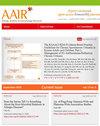左西替利嗪在保持工作效率的同时治疗变应性鼻炎的疗效
IF 4.1
2区 医学
Q2 ALLERGY
引用次数: 0
摘要
变应性鼻炎症状的表现和严重程度呈昼夜变化,对患者的生活质量、日常活动和工作效率产生负面影响。症状在夜间或清晨加重,因此在傍晚给药左西替利嗪可能更可接受。因此,本研究评估了夜间给药左西替利嗪对变应性鼻炎患者24小时症状控制、身心健康和白天嗜睡的有效性。该研究是一项前瞻性、开放标记、单臂、双中心、变应性鼻炎患者的观察性研究。左西替利嗪为5毫克或10毫克,每天一次,晚上口服,睡前至少7天。记录患者自我报告的变应性鼻炎症状和体征的24小时鼻症状总评分(TNSS)。此外,研究评估包括SF-12量表(生活质量)、斯坦福嗜睡量表(嗜睡程度)和工作效率和活动障碍(WPAI)问卷。这些评估在基线(第0天)和第1天(24小时)、第3天和第7天的预定间隔进行。结果表明,夜间给药左西替利嗪有助于24小时症状控制,而对患者白天嗜睡、日常活动和工作效率无明显影响。本文章由计算机程序翻译,如有差异,请以英文原文为准。
Effectiveness of levocetirizine in treating allergic rhinitis while retaining work efficiency
The manifestation and severity of Allergic rhinitis symptoms show diurnal variation which negatively impacts the patient’s quality of life, day-to-day activities, and productivity at the workplace. The symptoms worsen at night or early morning and therefore administration of levocetirizine towards evening may be more acceptable. Consequently, the present study evaluated the effectiveness of evening Levocetirizine administration on 24-hour symptom control, Physical and mental health, and daytime somnolence in patients with allergic rhinitis the study was a prospective, open-labeled, single-arm, two-center, observational study among patients with allergic rhinitis. Levocetirizine was prescribed as 5 mg or 10 mg once a day evening oral dose for at least 7 days before sleep. The 24-hour total nasal symptom scores (TNSS) for self-reported signs and symptoms of allergic rhinitis were recorded. Additionally, study evaluations included the SF-12 scale (Quality of Life), Stanford Sleepiness Scale (degree of sleepiness), and work productivity and activity impairment (WPAI) questionnaires. These evaluations were performed at baseline (Day 0) and at scheduled intervals of Day 1 (24-hour), Day 3, and Day 7. Results demonstrated that evening administration of Levocetirizine facilitates 24-hour symptom control while having no significant effect on daytime somnolence, daily activities, and the work productivity of patients.
求助全文
通过发布文献求助,成功后即可免费获取论文全文。
去求助
来源期刊

Allergy, Asthma & Immunology Research
ALLERGY-IMMUNOLOGY
CiteScore
6.10
自引率
6.80%
发文量
53
审稿时长
>12 weeks
期刊介绍:
The journal features cutting-edge original research, brief communications, and state-of-the-art reviews in the specialties of allergy, asthma, and immunology, including clinical and experimental studies and instructive case reports. Contemporary reviews summarize information on topics for researchers and physicians in the fields of allergy and immunology. As of January 2017, AAIR do not accept case reports. However, if it is a clinically important case, authors can submit it in the form of letter to the Editor. Editorials and letters to the Editor explore controversial issues and encourage further discussion among physicians dealing with allergy, immunology, pediatric respirology, and related medical fields. AAIR also features topics in practice and management and recent advances in equipment and techniques for clinicians concerned with clinical manifestations of allergies and pediatric respiratory diseases.
 求助内容:
求助内容: 应助结果提醒方式:
应助结果提醒方式:


